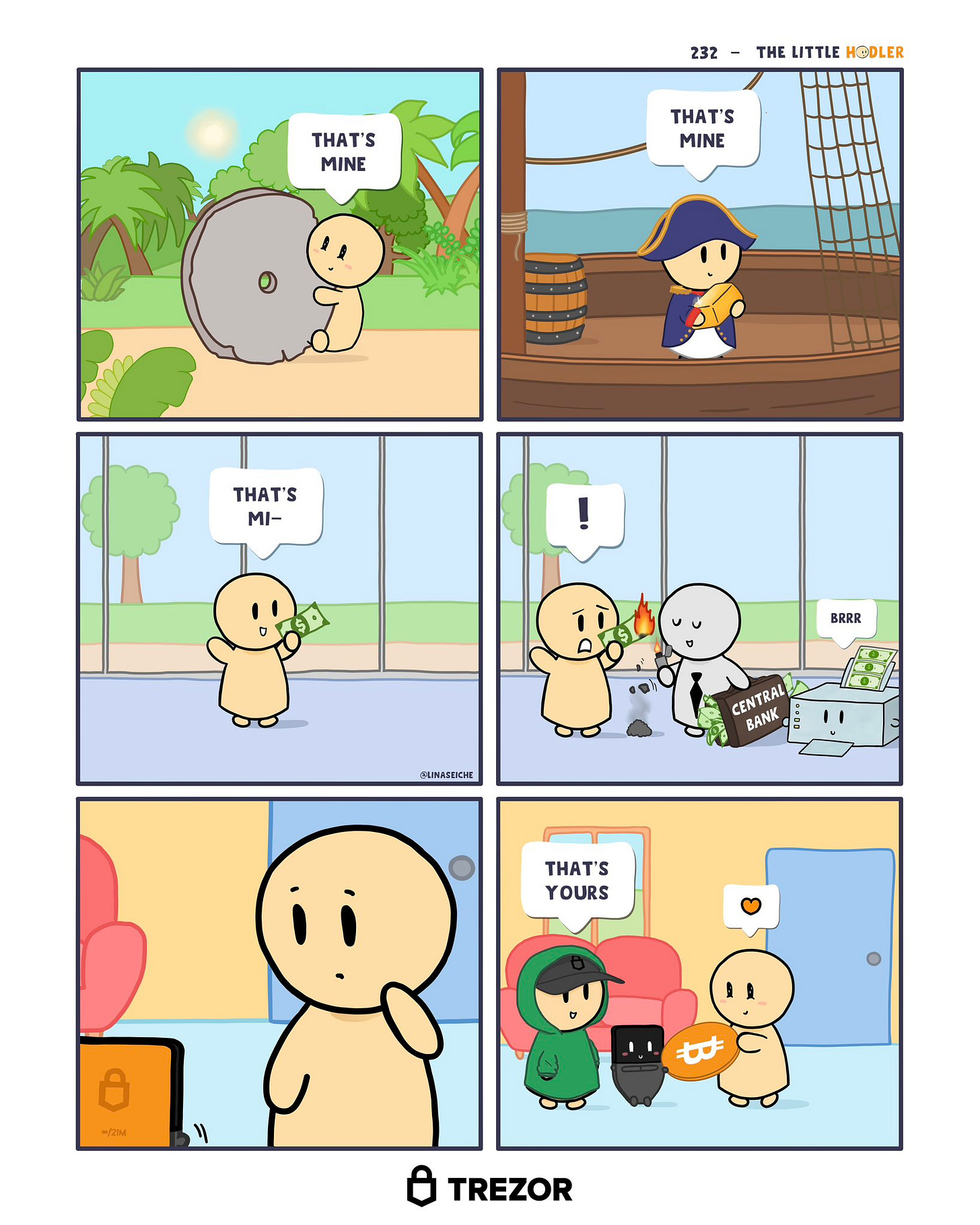Bitcoin Tech Talk #381
Interesting Stuff
Reinterpreting the Marshmallow Test - The marshmallow test is one of those legendary studies in self-restraint. Supposedly, a kid who can wait 5 minutes for a second marshmallow has a much better chance of success than one who can’t. Yet, this article makes you wonder, is self-restraint what that test is measuring? As the article argues, it’s more likely what the test measures is compliance to authority and indeed in a fiat world, compliance gets you pretty far. It also explains why Asian-Americans are so successful as we come from a conformist/compliance culture.
Declining Fertility Rates - That birth rates are down all over the world is a given and known by most governments. What to do about it is another matter. This is a deep article full of interesting facts and correlations about what to do about the coming demographic time bomb. This is a long article and it has a lot of different suggestions. What’s remarkable is that all of the suggestions are statist, arguing for new or augmented government programs. It does not occur to the author that the major problem is government itself, and the enormous cost of supporting it. As I’ve argued in many places, cutting government significantly would increase fertility everywhere.
Artificial Sweeteners - An interesting article on how they found artificial sweeteners that are in use today. What seems to be the case is that chemists accidentally taste all kinds of different chemicals and basically found some that were sweet. One of the things that I learned from the article is that sweetness has no correlation to energy density. It seems the taste itself is being hacked by plants to get you to ingest it. As with most foods, you should be careful about what you ingest.
What I'm up to
Bitcoin Inheritance - I talked to Anthony Park about what normally happens with death and inheritance and what things that happen from a legal perspective. He shared his experience being a probate lawyer and how heirs behave and how people handle instructions. We talked also about specific challenges with respect to Bitcoin and what are some of the considerations that most people don’t think about. He also has a solution for getting something in place, which can be upgraded later as better tools come out.
Destroying Rent Seeking - Here’s my talk from the Adopting Bitcoin conference in Cape Town, South Africa. I showed how rent seeking is prevalent at so many different layers of society now and how that’s causing civilization to stay static or go backward. The financial games almost everyone plays takes value from those who produce it and render such endeavors less profitable. Hence, we don’t get much building of civilization. I prepared a longer talk, but there were some time constraints, so hopefully I’ll get to give this talk again sometime.
Lipscomb University - I will be in Nashville to give a lecture at this Christian University about Christianity and Bitcoin, based on my book, Thank God for Bitcoin. This is not normally a topic people engage in, let alone college students, so it should be a lot of fun. If you’re around Nashville on Feb. 15, please come by and say hi.
Nostr Note of the Week
What I’m Promoting
Unchained Capital is a sponsor of this newsletter. I am an advisor and proud to be a part of a company that’s enhancing security for Bitcoin holders. If you need multisig, collaborative custody or bitcoin native financial services, learn more here.
Bitcoin
btcd Consensus Error - btcd, the go implementation of Bitcoin software, had a bug related to OP_CSV/OP_CLTV which were disclosed in this post. It seems that btcd didn’t convert the version number of the transaction field properly, treating it as a signed 32-bit integer instead of an unsigned 32-bit integer, causing negative numbers to fail, where they should succeed. It’s a subtle error, and a good thing that the disclosure was done responsibly. Consensus is very tricky and getting things like this right can be very difficult.
Trezor Phishing Attack - There was a data leak from Trezor which unfortunately has meant that there are already phishing emails being sent out. What’s particularly awkward is that these phishing emails come from Trezor’s domain and are signed with their private key, suggesting that this may be a pretty deep breech. I would seriously think about switching away from Trezor as data breeches tend to precede more serious breeches.
OP_CTV Overview - Covenants are a big topic and OP_CTV is perhaps the most advocated for covenant-enabling OP code out there. This article explains how CTV works and goes deep into code examples. CTV has been something a lot of people have been pining for recently, especially as new functionality around Lightning is getting explored. There are more people that seem to be warming to it, though I’m not sure there’s consensus.
Lightning
Practical DLCs - Mutiny Wallet now has some very basic DLC support. There are two specific things you can now do. The first is the ability to be an oracle which publishes findings to Nostr. The other is the ability to make bets based on the oracle findings. I remain a little skeptical about whether this sort of thing adds value over the long run, as they’re usually sold as ways to hedge risk, but end up being used to gamble and increase risk purposefully. That said, it’s an important and interesting thing to be watching.
Taproot Swaps - Boltz has a new feature for Lightning to on-chain swaps that are now instant using Taproot. The main idea is that there’s a way to get your coins back quickly if the swap fails using a MuSig2 Tapscript. This should make the failure modes a lot friendlier for users and the option of being able to swap into Liquid instead of Bitcoin could potentially save some money.
Exchange Adoption Lagging - About 6% of exchanges have integrated lightning, which is obviously pretty low. This suggests that most of these exchanges are heavily involved with altcoins and that seems to be the more desirable ways to expand and that Bitcoin is being used more as a store of value. In my experience, the companies most likely to integrate Lightning are ones that are catering to Bitcoiners. Sadly, most exchanges are catering to altcoiners instead.
Economics, Engineering, Etc.
Bitcoin Health - Lyn Alden looks at various metrics of the health of Bitcoin and the rationale for each metric. She shows how price, liquidity and salability all point to a pretty healthy ecosystem. The most interesting part of the article for me was the analysis of salability as a key metric for usability. The ability to convert your Bitcoin with currency brokers is a major factor in a currency’s popularity, and thus, health. The rest of the article goes through mining, services and other things that are good indicators of health. Overall, a good read to understand what metrics we can look at to gauge the health of Bitcoin.
Discount Window - This rather obscure method by which banks remain solvent is about to undergo a 2008-like transformation. For those that don’t remember, Treasury Secretary Hank Paulson forced every major bank to borrow a ton of money from the treasury as to hide the insolvency of the banks that were in trouble. Essentially increasing the anonymity set so the public wouldn’t know. The discount window, which lends to banks that can’t get loans anywhere else, is now about to force a similar dynamic by forcing all banks to get loans as to hide to the banks that are in enough trouble as to need loans from the discount window. As you might expect, this will add a lot of liquidity, or money into the banking system, much of which will just be held by the banks. TL;DR Money printer about to go brrr.
ETF and US Gov’t - Avik Roy argues in this piece that the existence of the ETF now makes it extremely difficult to ban Bitcoin in the US. The main argument is that there are now entrenched special interests that will lobby against such a ban. While this is great news, there’s, of course, a tradeoff. It’s entirely possible that altcoins get their ETFs and solidify their position as well. Given how incredibly scammy they are, this could become their hope even as governments crack down on them.
Quick Hits
CSW v. McCormack - It’s over, apparently. Justice seems to have been served here, and the prospects for CSW in the COPA trial seem pretty bad as well.
FinCEN Rule - Apparently, there’s a new proposed rule around coin mixing which would remove a lot of privacy. The link is to the objections being lodged by a bunch of Bitcoin companies.
Rebuttal to Rizzo - Stephan Livera has a good rebuttal to Pete Rizzo’s appearance on What Bitcoin Did regarding ordinals.
UN Mining Report Response - BTC Policy Institute has a paper on the ways in which the UN report is wrong.
Fiat delenda est.








